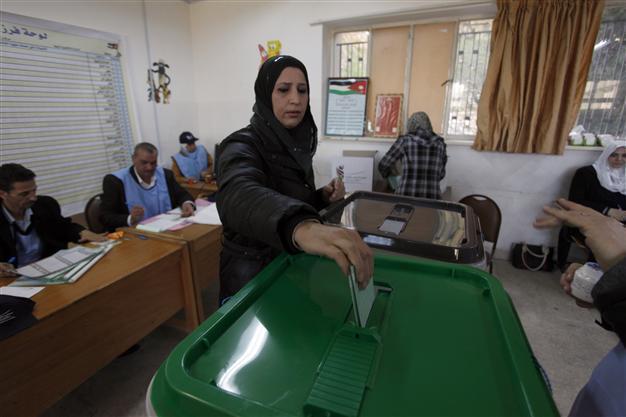Jordanians vote in election snubbed by Islamists
AMMAN - Agence France-Presse

A Jordanian woman casts her vote at a polling station during the first hours of the Jordanian Parliamentary elections, in Al-Salt, Jordan, Wednesday Jan. 23, 2013. AP Photo
Jordan voted Wednesday in a parliamentary poll snubbed by Islamists who have staged strident pro-reform protests and who have already slammed what is expected to be an opposition-free body as illegitimate.
The Independent Election Commission announced a turnout of 19.69 percent, or nearly 480,000 people out of a total registered electorate of 2.3 million six hours after polling stations opened at 0400 GMT.
"The nation will not come to a halt at the request of this party or that group," Prime Minister Abdullah Nsur told a news conference, referring to the Muslim Brotherhood.
He dismissed claims that Jordanians were not turning out to cast their ballots after the powerful Islamist group boycotted the election.
"If people do not want to vote, it is because they were not convinced of the performance of past parliaments or electoral integrity," he said.
A total of 1,425 candidates, including around 140 former MPs and 191 women, are contesting 150 seats in parliament's lower house.
After voting in his home town of Salt northwest of Amman, Nsur insisted that "this time, the elections are clean. It is a step towards reform and not an end to reform." "After the elections, I will submit my resignation to his majesty the king. It is up to him to decide," the premier said.
In Amman, rented cars offered to ferry voters to polling stations, where supporters of the candidates gathered hoping to sway the undecided.
"I voted to help my country fight corruption. It is a national duty. Everyone seems tense," Abedrabbo Abu Hedib, 55, told AFP after voting in west Amman.
"We have high hopes that the new parliament will help come up with change that we aspire to." The Islamists and the National Reform Front of former premier and intelligence chief Ahmad Obeidat are staying away from the polls, arguing that there is no real will to reform.
"The coming parliament will be short-lived because it will not have any political weight," Zaki Bani Rsheid, deputy leader of the Brotherhood, told AFP soon after polling began.
"Our boycott was the right decision because a parliament or government that is imposed on people is i
llegitimate," he said.
The Arab Spring that began two years ago and toppled four regimes across the region also sparked regular protests in Jordan, where a combination of youths and Islamists have been demanding sweeping political and economic reforms.
Their protests have become increasingly vocal and, during deadly November rioting over a sharp hike in fuel prices, there were unprecedented calls from some quarters for King Abdullah II to step down.
The monarch, whose position is not thought to be under serious threat, is hoping that the election will produce a new crop of strong MPs who will work efficiently to jump-start reform.
But analysts say tribal leaders, other pro-regime figures and independent businessmen are set to sweep the polls in the country of 6.8 million people.
The vote "will add to problems instead of solving them, particularly under the boycott. We will see a parliament that does not have political weight," analyst Oraib Rintawi of the Al-Quds Centre for Political Studies told AFP.
The king has said he plans for the first time to consult with MPs before naming a prime minister, insisting that strong political parties are needed to help pave the way for parliamentary government.
Islamists also object to existing constituency boundaries which they say over-represent loyalist rural areas at the expense of Islamist urban bastions.
They and Obeidat are also angry at the lack of genuine reform, little progress in fighting corruption and a failure to move towards a constitutional monarchy with the premier chosen by parliament rather than the king.
Jordan has acute economic problems, including a $5-billion (3.6-billion-euro) budget deficit, and challenges in coping with more than 300,000 Syrian refugees who have fled their war-torn country.
Unemployment in the poor desert kingdom officially stands at 14 percent, but non-governmental sources put the figure as high as 30 percent.
